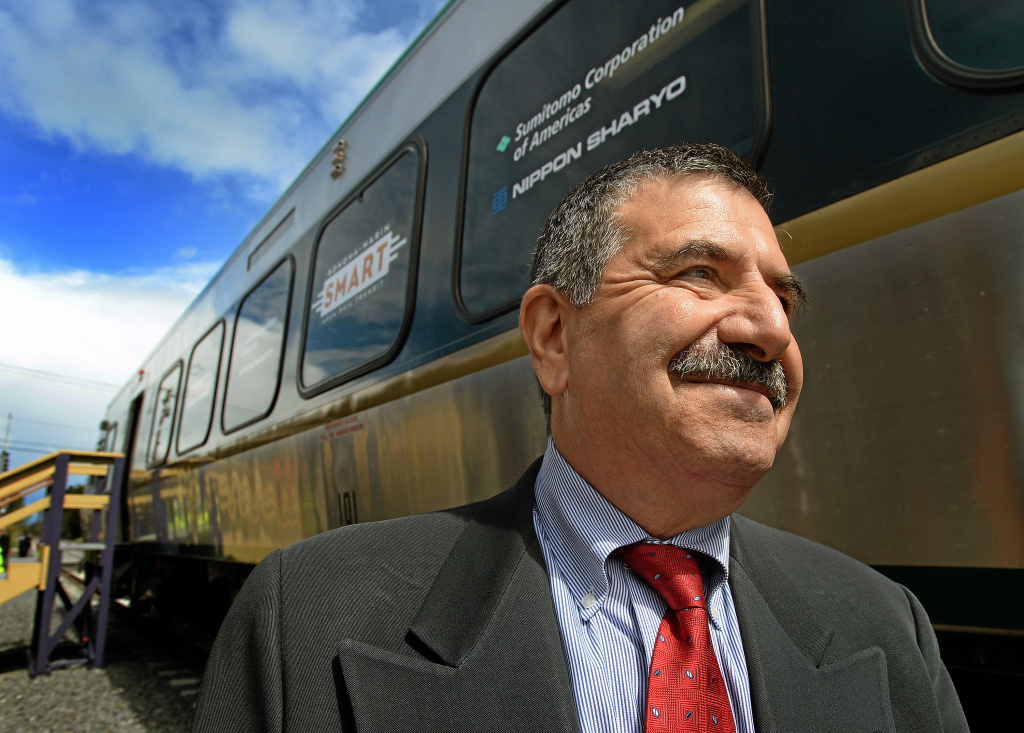The general manager of Sonoma-Marin Area Rail Transit is stepping down after a 10-year run leading the startup service.
Farhad Mansourian announced at SMART’s board meeting on Wednesday that he plans to retire in August. Prior to launching the rail line, he worked at the Marin County Department of Public Works and led it for nine years.
“Before SMART, I served 32 and a half years in Marin County,” Mansourian, 67, said in an interview Thursday. “That’s 42 years of public service that I’m very proud of. It’s time for me to spend more time with my family, as a husband and grandfather.”
Mansourian was hired as SMART’s top manager in August 2011. His starting salary was $246,000 a year, and his ending salary is $319,595.
“It’s been an absolute pleasure working with Farhad,” said Novato City Councilman Eric Lucan, who has been a SMART board member since 2011. “Getting this train rolling would have been an accomplishment of a lifetime for anybody, and by my math he did it in about six years. That’s just an incredible accomplishment.”
Kate Colin, a SMART board member and mayor of San Rafael, called Mansourian “determined and fearless” when it came to creating the rail line. She said he had to solve the puzzle of working with several towns and jurisdictions to lay tracks and get trains running.
“He continued the work that voters started when they passed Measure Q,” Colin said. “It’s not easy to take a concept of something that doesn’t exist and build it out of nothing, and he did that.”
Sonoma County Supervisor David Rabbitt, chair of the SMART board, said he will ask a few directors to come up with options for a succession plan to be presented at an upcoming meeting.
“It’s not an overstatement that SMART would not have been built without Farhad Mansourian, and he remains the glue that holds the organization together,” Rabbitt said during the board meeting.
Mansourian steered the agency as it built a $650 million, 45-mile rail system with 12 stations in Santa Rosa, Rohnert Park, Cotati, Petaluma, Novato, San Rafael and Larkspur.
Since SMART opened in August 2017, it has been a magnet for critics who say it’s too expensive and will do little to solve the region’s traffic problems. But the rail line is also a symbol of better days for supporters who say it could help clear freeways of commuters who drive alone.
The arguments have been underscored several times as the agency struggled to keep ridership numbers up. It recorded just over 700,000 trips in the first two years of service, a number that dropped dramatically through the pandemic.
Additionally, the agency has hit walls when it comes to completing the promised multiuse path along the rail line.
The most recent setback came last March with the failure of Measure I, which sought to extend the district’s quarter-cent sales tax by 30 years.
“I’ve got to confess that we didn’t always see eye to eye,” said Jack Swearengen, a Santa Rosa resident and chairman of the Friends of SMART community advisory organization. “But he’s done incredible things in his past 10 years or so. You’ve got to look back and say, wow. I tip my hat to him.”
Not everyone is a fan.
“The departure will provide an opportunity for the board to address some deficiencies and why it lost as bad as it did in March 2020 in the case of Measure I,” said Novato resident Mike Arnold, the campaign treasurer for the NotSoSMART opposition to the Measure I initiative and a longtime critic of the agency.
“There has been a lack of transparency and oversight of staff,” he said. “Hopefully in the future the board will step up — they’ve certainly expressed interest in being more transparent — and hopefully the next general manager will too.”
Mansourian, who has lived in Novato for the past 40 years with his wife, has two children, four grandchildren and a fifth grandchild on the way.
Reflecting on his career, he said, “We did a terrific job of taking cars off of the Highway 101 corridor.”
“There are things I could have done better here or there, but that is part of learning,” he said.
Mansourian said he is proud of the fact that SMART trains never stopped running through the pandemic and that they provided transportation for essential workers.
He said there is a bigger picture for SMART, with a plan to expand to Cloverdale and the East Bay, as well as completing the bike and pedestrian path.
But he noted that these large infrastructure projects take time. He cited Bay Area Rapid Transit, which is working on its expansion to San Jose after 45 years, as an example.
“I’ve brought SMART 60, maybe 70% of the way,” he said. “It’s up to the next person to finish it off.”

